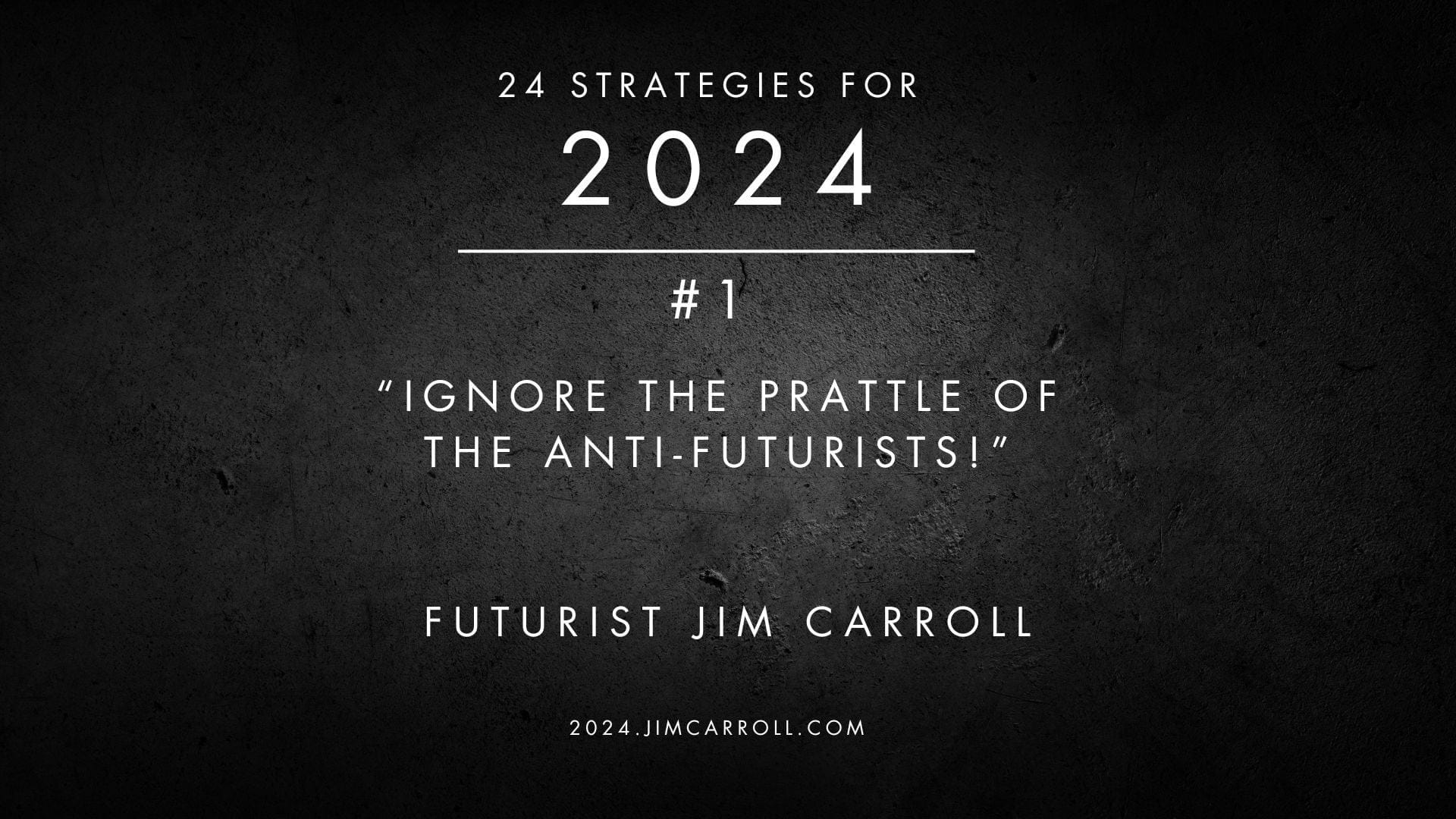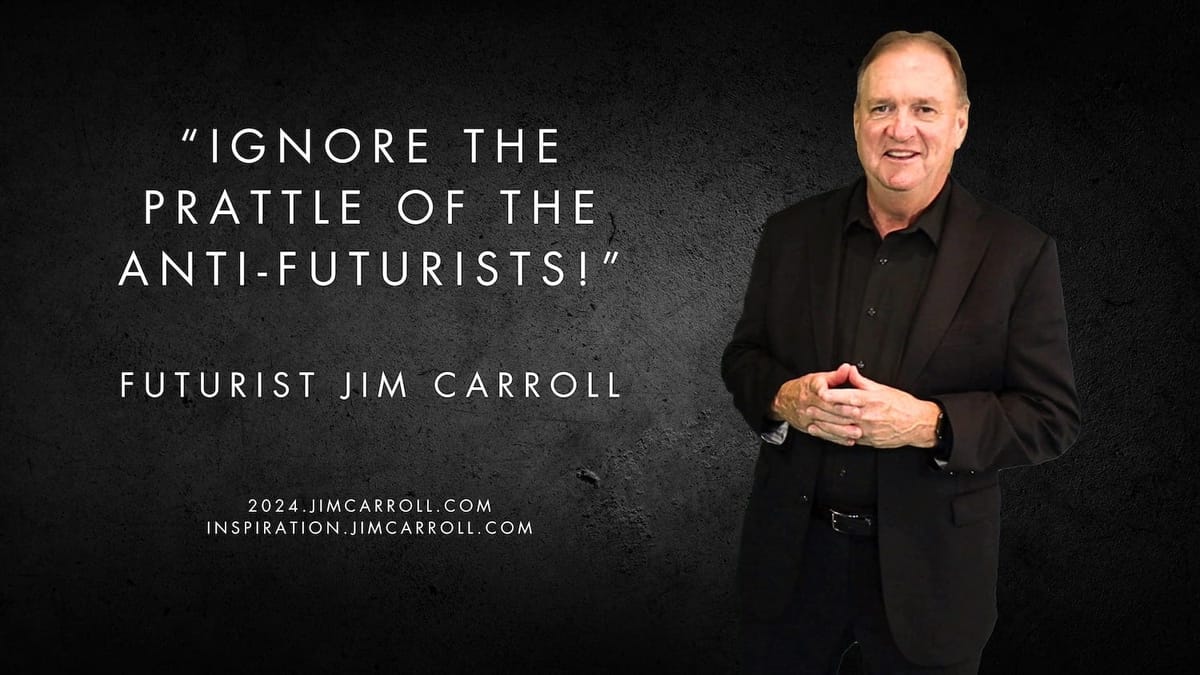Futurist Jim Carroll is running a series that began November 27, 2023, and will end on January 1, 2024 - '24 Strategies for 2024.' Rather than running a trend series for the upcoming year as he has previously, this series will examine a number of his personal beliefs on how to best align yourself with the future. There will be a post each weekday, excluding weekends and holidays, until the series runs its course. You will find it on his blog at
https://blog.jimcarroll.com,
or on the website
https://2024.jimcarroll.com
)
Negativity doesn't become thee, and yet you are surrounded by it.
Ignore it.

Think about it - all of us are surrounded by those who are determined that our belief in a better future is a false hope; that the technologies, trends, and disruptive ideas that we see as opportunities are nothing but a sham of misplaced optimism; that our belief in the trends of tomorrow is misguided and wrong. I learned a long time ago to ignore much of what they say and have usually been right in my decision.
And yet as their voices get louder and their ranks steadily increase, it is more important than ever to simply tune them out.
If you listen to them, you would think that electric cars are dead, renewables are a hoax, and science is but a plot. They pounce gleefully on any small item or a study that might justify their viewpoint or give them the narrative they want; in doing so betraying their ignorance of the fact that the future is not linear - that goes forward in an uneven path with spikes and twists. And more often than not, in the long run, they are proven to be dead wrong in their predictions.
I first clued into their existence in 1999 when I read the book, The Future and Its Enemies: The Growing Conflict Over Creativity, Enterprise and Progress. The description of the book on Amazon says it all:

Today we have greater wealth, health, opportunity, and choice than at any time in history. Yet a chorus of intellectuals and politicians laments our current condition -- as slaves to technology, coarsened by popular culture, and insecure in the face of economic change. The future, they tell us, is dangerously out of control, and unless we precisely govern the forces of change, we risk disaster.
We find ourselves in the midst of the reality of the prediction of this book today, and if you take a look at what is happening, it really is a story of dueling headlines.
Consider, for example, electric cars. Apparently, the demand for such vehicles is both collapsing and growing at the same time, a pretty remarkable feat!
Wheels come off green revolution as demand for electric cars stalls
The Sunday Times, 12 November 2023
Car sales accelerate, with electric vehicles in slow lane
thetimes.co.uk, 19:01, 6 November 2023
Electric car sales continue to falter: Demand last month dwindled and manufacturers risk falling short of costly EV targets
Mail Online, 3:15, 7 November 2023
Surge in sales of electric vehicles
The Sun, 17 October 2023,
Electric Vehicles Account for a Fifth of California Auto Sales
OPIS News Alerts, 3 November 2023
Volkswagen increases sales of electric vehicles by 45% in January-September
CE NAFTA 2.0-USMCA, 25 October 2023
The anti-futurists seize upon any sign of slowing demand for electric cars to provide proof that it is a failed initiative; what they don't realize is that, as with many trends, the shift to a new transportation platform built on batteries and the elimination is a trend that in the long term is a basic reality. The technology, economics, transformative investments, and climate significance are far too advanced at this point to turn the trend around, let alone eliminate it.
Similarly, we are told that renewable energy is but a folly, a disastrous choice, a fool's errand - that it will never be able to provide the reliability of supply demanded by a modern functioning economy. The headlines and reality betray that storyline though; I can pick just a few that are indicative of what is really happening.
Renewables meet 67% of Portugal's power demand in Oct
Renewables Now, 5:48, 6 November 2023
Georgia Power seeks to add 10 GW of renewables by 2035 amid soaring demand
Platts Energy Trader, 30 October 2023
Investments in renewables need to triple to meet demand sustainably: Report
Northeast Now, 27 October 2023
And yes, I am cherrypicking my own optimistic future-oriented narrative. Yet such numbers also lay bare the dramatic economic impact of this trend: renewables have created more jobs than the fossil fuel industry in the US from 2016 to 2019, as it has become cheaper to build and maintain this new infrastructure instead of fossil fuel power plants. Some simple facts:
- From 2016 to 2019, renewables added 207,000 jobs, double that of oil and gas.
- In 2019, 3.36 million people worked in renewables, compared to 1.19 million in fossil fuels.
- Only eight states, including Texas, Alaska, Louisiana, Oklahoma, and Wyoming, have more fossil fuel jobs than renewable ones.
As for unreliability?
- The highest percentage of renewable energy generation in Texas was 23.7% in a single day
- California achieved a record of 97% renewable energy generation on its power grid for a brief period
- several countries, especially in Africa, have high percentages of renewable energy use in general. For instance, the Democratic Republic of Congo uses 96.24% renewable energy and the Central African Republic uses 91.26%.
Of course, not everyone who expresses negatively about the future is agenda-oriented.
Some people are uncomfortable with change, especially rapid or unfamiliar changes. The future often is a great unknown, and for some, the unknown is frightening. This leads to a desire to cling to the familiar or the past. Others are caught up in a nostalgia dream, clinging to a past that no longer exists. Others have very real technology anxiety - the rapid advancements in technology around us today can be absolutely overwhelming. For others, it is actual technological fear, where they are doomstering to the beat of new technologies, such as artificial intelligence, robotics, and genetic engineering. And yes, there are economic concerns, where changes in the economy, driven by technological advancements and globalization, are leading to job losses in certain sectors.
I certainly take my time to listen to and understand the concerns, worries, and viewpoints of these many disparate groups.
But where I have learned to close my mind is to those who are agenda-driven, guided by a political viewpoint that is not grounded in reality, or in other cases, with those who have gone down the rabbit hole of madness, lost in the swirling delusions of what were once brilliant minds. As a futurist - someone who simply studies obvious future trends and interprets them for people around me - I dub this group the 'anti-futurists.' They are caught in the trap of being anti-future as predicted in Virginia Postrel's book of more than 30 years ago.
It's in your best interest to ignore them, rather than fight them, and save your energies for the trends, opportunities, and optimism that tomorrow represents, and for the action that matters.
Ignore their prattle and their babble, and carry on.
Futurist Jim Carroll has developed an impressive skill of ignoring delusional people.

